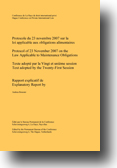Second Issue of 2013’s Journal of Private International Law
 The latest issue of the Journal of Private International Law was just released.
The latest issue of the Journal of Private International Law was just released.
The Proposal for a Regulation of the European Parliament and of the Council on a Common European Sales constitutes an attempt to avoid transaction costs caused by legal diversity within the European Union. However, the character and scope of CESL rules, together with their complex interaction with European conflict-of-laws rules and the substantive acquis, leads to a scenario of legal uncertainty. This means that the intended objective will not be achieved and, in certain cases, that consumer protection is sacrificed in favour of traders’ interests. In order to illustrate this critical conclusion, this article analyses the character and scope of CESL rules. Secondly, the application of CESL rules is considered in cases of an express or implied choice of law and in the absence of such a choice. Finally, further reflections will focus on the application of overriding mandatory rules and on the seminal question of the applicable law to interpret contracts.
When in private international law reference is made to a multi-unit State, the question arises which one of the various territorial legal regimes applies to the specific case. With the predominance of territorial connecting factors in EU private international law, this question will become more important in the near future, given that territorial legal regimes will increasingly have to be applied also to non-nationals of multi-unit States. An analysis of the provisions on reference to multi-unit-States in the EU Succession Regulation as well as in previous EU-Regulations on private international law shows a lack of continuity and coherence which reveals that there may be insufficient awareness of the different features of the three models that can be identified for solving the problem of multi-unit-States in private international law. By offering a system of these basic models, this Article puts the provisions on multi-unit-States of the EU Succession Regulation under critical review and pleads for a general, simple and coherent solution with the hope of improving future EU private international law legislation on this point.
In court proceedings commenced after 10 January 2015 the choice of court agreements in the European Union will be regulated by the new Brussels I Regulation (recast). The amendments introduced by the Recast aim to increase the strength of party autonomy as well as predictability of the litigation venue. Therefore, several changes have been made – the requirement that at least one party has to be domiciled in a Member State was abandoned for choice of court agreements, the substantive validity conflicts rule and a rule on severability have been introduced. Most importantly, the rules on parallel proceedings have been altered. This article examines those modifications and discusses their effect on the European Union courts’ desirability as a place for litigation.
Libel tourism, which is much related to the UK, is caused by a mixture of factors, such as the law applicable, national and European rules of jurisdiction, national choice of law rules, and case law of the CJEU. These issues as well as aspects of recognition and enforcement of libel judgments in the US and EU are examined. Proposals for reform and legislative action in the EU are made. The effect of the Defamation Act 2013 on libel tourism, in which the UK attempts to strike a better balance between freedom of expression and privacy and to deal with libel tourism, is examined.
In 1994 the Supreme Court of Canada in Tolofson v Jensen adopted a new and controversial choice of law rule for tort claims. Under that rule, the law of the place of the tort applies absolutely in interprovincial cases and applies subject only to a narrow exception in international cases. The approaching twentieth anniversary of this important decision is an appropriate time to consider how the rule is operating. In particular, the rule needs to be assessed in light of (a) calls for legislative reform from the Manitoba Law Reform Commission, (b) the European Union’s adoption of the Rome II Regulation for choice of law in non-contractual obligations, (c) the ongoing operation of a competing rule under Quebec’s civil law and (d) the application of the rule by Canadian courts since 1994. This article will assess Canada’s tort choice of law rule and analyse the desirability of reform, looking in particular at the rigidity of the rule, the scope of its exception and possible alternative rules.
The idea of employing conflict-of-laws principles to address competing rationalities in international law is unorthodox, but not new. Existing research focusses on inter-systemic conflicts between different areas of international law – but has stopped short of proposing concrete conflict rules. This article goes a step further and reviews the wealth of private international law approaches and how they can contribute to applying rules of another, ‘foreign’ system. Against the background of global intellectual property rules and their interfaces with trade, investment, health and human rights, the dispute over plain packaging of tobacco products serves as a test case for conflict-of-laws principles. It shows how these principles can provide for concrete legal tools that allow a forum to apply external (ie foreign) rules – beyond interpretative concepts such as systemic integration. The approach hence is one way to take account of the pluralism of global legal orders with significant overlaps and intersections.
